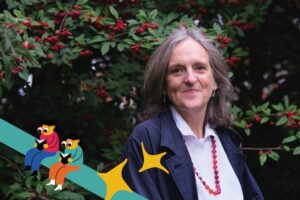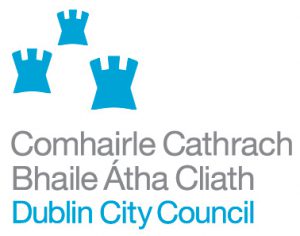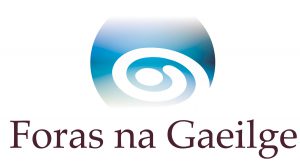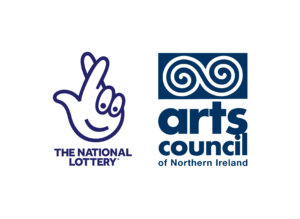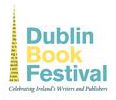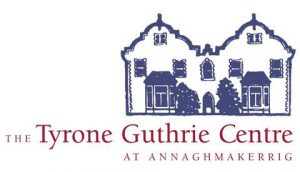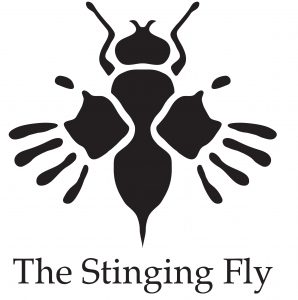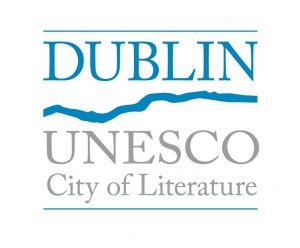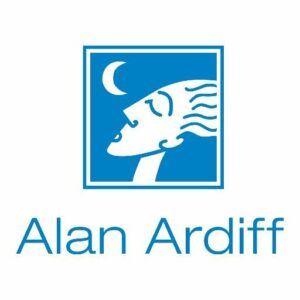
07 July, 2025
Our Young Writer Delegates look back on Belfast Book Festival 2025
Last month, writers, readers and book-lovers from far and wide travelled to Belfast for the Belfast Book Festival 2025. From 5-9 June, attendees were treated to a week full of readings, conversations, film screenings, walking tours, events and special guests, which showcased new voices, diverse writing, Irish and international writing talent.
Among the attendees were our Irish Writers Centre/BBF Young Writer Delegates, Joshua Beatty, Beth Healy, Nicole Lee Jiaqi and Sean Rowan. As part of the festival our Young Writer Delegates took part in a showcase event where they got the chance to perform some of their work to a packed audience in the Crescent Arts Centre, along with the awardees of our programme for emerging writers, New Voices: North. Their local writer-mentor Chris Wright was in attendance, along with New Voices: North mentors Jan Carson and Stephen Sexton.
Each year, the delegates attend events of their choice and write a review of their experience; here are the reviews our delegates wrote up for BBF 2025!
An Avoidance
Joshua Beatty
So I can come and go without consequence
they strap a salmon-pink strip to my wrist.
Same colour as the hand-me-down jumper
moth-gnawed now, remnant of your first wage.
In August, we will converge like tracer rounds
to the place of non-obligation, of sunk sofas
grey dog hair, red wine. August was born for this
but June is for blessing at flies outside Husk
for buying the book to get it signed, for questions
about you asked to a novelist in purple pants.
Tearing up to Michael’s character process.
Drag them to the ledge, coax them down.
*
I should call and tell you how busy I am.
You’d say all this sounds so much like me.
Off-grid, the takeover story posts lost on you
but I could pick up the phone. Few taps, a ring
or six and you’d hear my voice again. I read today
to a crowd. You’ve never heard that voice on me.
Getting told by Sheelagh to tread light upstairs.
There’s an event on in there – writing through grief.
Since eight years old I memorised the song
your steps creaked out, the heaviest now.
The whir of the lift in your building. Nothing
to wait for but post. The Crescent is full tonight.
*
I send a photo of me on stage to Mum
and forward that to Nan. Dad sees it online.
No photo to you. No photo from you either.
No call no text the no’s go on on on no no
Listening to Noreen talk about siblings.
Words twirled in air like flatness like hate
The reading went well. People were nice.
You and a guitar would’ve done better.
Someone else compliments my pacing.
Too much breath hung in dead air now.
I should call. I’ve been busy.
I’ve been busy. I should call.
An Evening with Tessa Hadley hosted by Lucy Caldwell – Belfast Book Festival
An Evening with Tessa Hadley hosted by Lucy Caldwell reviewed by Beth Healy
As I slipped into a seat in the back row, precariously balancing my takeaway coffee with my laptop, bag and other things brought directly from my teaching job, and having never actually read or come across Tessa Hadley’s work before, my expectations for the evening were somewhat nonexistent. I was here, soaking up the atmosphere and attending as many events as I could. I was excited just to be in a room with writers.
Nonetheless, I did not expect to spend the following hour and a half enraptured by every word that came out of Hadley’s mouth, feverishly scribbling down quotes from her in my pocket notebook as she spoke them.
Tessa Hadley is a British writer of novels, short stories and nonfiction and her work became more widely known following her receipt of the Hawthornden Prize in 2016. However, leading up to this achievement were years of toiling away at novels behind the scenes, novels which have never made their way out of her home into the public. Her debut novel, Accidents in the Home, was published in 2002 when she was 46.
She speaks of her writing journey and her first four attempted novels candidly, saying that on some level, she knew something wasn’t clicking, and she remained somewhat unfulfilled. In retrospect, she realised the reason was that, “[I] had no nerve. I was too meek, too people-pleasing, I needed nerve.”
In these words, I heard something of myself. She stressed the importance of subject matter, a point I had never heard other writers pay much attention to before. She continued on to explain how, at its best, writing well is about finding the right words and the right subject matter, to tell the uncomfortable truth only you could tell.
Amongst these nuggets of wisdom were other moments of sheer magic. Hadley linked the freedom of using the third person as essential in developing a sense of ‘nerve’, explaining that, “You get to be God.” For Hadley, other perspectives offer only a window into an individual consciousness, whereas the third person allowed her that all-seeing, all-knowing observational space from which to truly begin to have power over the flow of events in a story. Instead of letting the story dictate its next move, Hadley was able to “be more Godlike and bossy,” by asking herself: then what? And then what? And then what?
As someone who is embarking on the journey of writing my first novel, all of this was hugely inspiring. In this world, which is so fast-paced and filled with competition, it’s easy to compare myself to writers who are already published at age 25, but hearing Tessa Hadley speak reminded me that sometimes good things take time and that the process itself is a worthwhile goal.
More than that, it was a talk filled with beautiful reminders as to why we write at all. Caldwell and Hadley spoke about the ‘moments of magic’ that take over during productive writing sessions, and about short story endings, which should be ‘left to sizzle’ like bacon in a pan. They spoke about the passage of time, and how books allow us to ‘catch’ the moment, and ‘hold it in’.
I didn’t want the evening to end.
But of course, it had to. As talks of writing turned more generally to the power of words themselves and of all writers first love, reading, Hadley ended the evening with words I will always remember, words that made me remember why all of us were sitting there in the first place, hushed in warm lamplight glow on a Saturday evening.
“No matter how much one loves writing, one always loves reading more, because reading teaches us how to live.”
With that, the talk came to an end, hands broke into applause, and the lights came up. I left the Crescent Arts Centre and walked home. Home, where words lay tucked into the pages of the books, read and unread, lining my shelves. Home, where words lay dormant in my mind, waiting to be born onto a page.
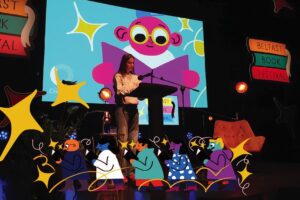
Fighting Words NI: Showcase by Belfast Book Festival
Fighting Words NI: Showcase reviewed by Nicole Lee Jiaqi
The whirlwind of life somehow brought me the gift of being part of Belfast Book Festival 2025. It was early afternoon when I found myself seated among a chattering crowd. Around me were proud parents, family members, and friends, many with phones in hand, ready to capture the moment their loved ones stepped onto the stage; ready to capture the moment to later on look back in loving sentiments.
Behind me was a row of seven young students whom are part of the wonderful Fighting Words NI, which is a youth charity and arts organisation that runs creative writing workshops. The students, with youthful faces, were waiting in what I believe was a mingle of excitement, nervousness and anticipation to showcase their creative pieces. To a certain extent, I felt nervous for them. I remember being their age. I would’ve never showcased my work then. I wanted to tell them being seated in that room was already a win, that their best was good enough, and that the audience is kind and receptive. Most of all, there would be no judgement, just warmth and love. This is, thankfully, not the corporate world.
The event soon began and it was MC’d by Translink’s first Poet in Residence, Niamh McNally. She introduced the first reader, and I was immediately struck by the calmness and confidence this young lady had while walking up the stairs and over to the mic. Her prose piece was titled Crazy Cat Lady. There was a natural rhythm to her reading: which was a warm invitation for the audience and myself to sit back and tune in. She painted vivid images of feline chaos and unexpected companionship. There were also moments of laughter from her humour and sharp observations. I was in awe over how mature she was writing for her age, especially in regards to the themes of her piece: identity, perception and perhaps even a hint of rebellion against stereotypes.
As the event progressed, I began to realise that this sense of maturity was something shared by all seven readers. One presented a beautifully reflective piece about a river, Another read an excerpt from a novel-in-progress. An exchange between two characters debating the perfect baking ingredients. It was witty, well-paced, and full of charm, a glimpse into a story written with both heart and humour.
The event soon came to an end, and I was left feeling not only proud, like I was a parent or a teacher of theirs, but with a sense of being immensely refreshed. As someone who once worked in commercial advertising, then eventually left it due to its lack of meaning, this experience felt like a return to something grounded and genuine. These young voices, unfiltered by marketing agendas, are to be cherished.
And so, I found myself fluttering out in a dream-like state, thinking of when I was their age, or perhaps all of their ages: to just be a voice, unfiltered by marketing agendas. The participants’ stories were all written with purpose and sincerity. It reminded me why storytelling matters, why spaces like this are so essential, and in this fast-paced, modernised, digital world we’re living in, they’re more necessary than ever.
The Stray Dog Followed Me In
Sean Rowan
The Stray Dog Followed Me In
The rubber-drone of the 212’s wheels
lifted me from a joiner’s story
somewhere in the greenery
of a Drumahoe park and ride,
and the window’s stammer
on the Glenshane Pass
as we swung eastward for Antrim
rattled something loose in me,
a nervous disposition,
a slow tail wag of quiet unease.
Crescent Arts Centre.
I thought on the name.
Crescent—broad in the middle?
Sickle-shaped? Moon-curve
pointing nightward on each side?
Or comfort,
a harvest moon,
hanging low
and unfamiliar
over a week of strangers.
I overthought.
It followed me in.
That country worry,
coy as a stray dog,
trailed behind
into the brick and asphalt bustle
of Belfast,
sitting with me
as I waited
for the others
I’d spend the week beside,
its tail tapping
occasionally.
Inside, we sat among
the murmur of early names,
paper cups and laptop lids.
The final talk that day,
in a wide room,
all oak floors and light drunk windows,
one of those rare,
seldom-sinking summer evenings
that fills all street divided buildings
with hot breeze
like a sail.
And on the stage:
giants.
Declan Meade,
Martin Doyle,
Tara McEvoy,
all names that sit in the foreword
of where the good stories live.
Cream-papered journals,
gold-standard voices,
places where anyone
worth their salt
might one day
try their name.
Phrases rang out:
good publications
good writers
always looking
for a
new voice
Stinging Fly
The Irish Times
Faber & Faber
We Love
a new
voice.
Then,
that stray dog again,
curled by my seat
with tail thudding
on the wide oak floor.
I thought,
in a world full of voices,
how does anyone begin?
But then,
Kavanagh. Kiely.
Names I had known
before I knew
they mattered.
Stories of cows in houses.
Sheaves, stacked.
Those who knew
what it meant
to watch a season, turn.
They ended with a thought
on how Ulster humour differs,
a little apart,
closer to hunger,
and simplicity,
and conflict,
how it lingers a while
after the reading,
quiet, dry-mouthed,
wary of overstaying,
like a stray dog.

